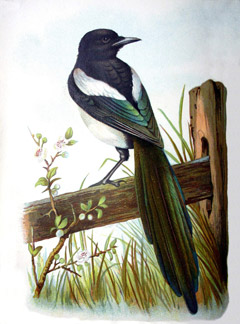Poetry
Although the essay/creative nonfiction is Arthur's favoured genre, he was one of five Ulster poets selected for inclusion in Lagan Press's Poetry Introductions 1 (Belfast: 2004).
His poetry has also appeared in a range of literary journals on both sides of the Atlantic, including: The Antigonish Review, Centennial Review, Cimarron Review, Cross Currents, Descant, Event, The Honest Ulsterman, Poetry Ireland Review, Southern Review, The Wascana Review.
"Beyond Aughlish", reproduced below, was first published in the Dalhousie Review Vol.67 no.4 (1987/1988), pp.399-401. It is one of the poems included in Poetry Introductions 1. According to Lagan Press:
"Chris Arthur's work represents a vigorous intellectual engagement with worlds around him: the natural, the political and the social. Whether writing about nature, the inner emotional landscape, or the larger forces outside, he brings to his work a discursive yet committed passion."
His interest in poetry is now focused on writing haiku. He has recently been working in collaboration with artist Claire Harkess on a series of bird haiku to accompany Claire’s paintings. A short film made for her “Seasons Song” exhibition at The Scottish Gallery in Edinburgh features Chris reading some of the haiku that were paired with Claire’s paintings at this exhibition, which ran from 7 March 2024 – 6 April 2024.
Beyond Aughlish
'In the name of God, Amen. I, John Arthur, of Aughlish in the County of Londonderry, being weak in body but of sound mind, memory and judgement, do make this my last will and testament in manner following. First, I leave and bequeath my soul to God who gave it...'
The opening lines of my Great Grandfather's will, dated 24th January, 1884
I
Among our campfire-catch of maxims, mottoes, superstitions, spells —
Shoals of folk-wisdom netted in a trice of words,
And brought up now and then to punctuate some current incident with
'this is how it is', 'the world is thus',
The bittersweet of raw experience trawled by a hundred generations
and honed to shapes familiar to the touch,
A fixed belief, confirmed by those who, unexpectedly, have lived,
That somehow, just before you die, your life jumps clear of all
forgetfulness,
And, like a leaping salmon, flashes past, shocking in its sudden
wholeness and unexpected nakedness.
II
Perhaps there is some truth in this, or maybe wishful thinking is
at work,
Or habit merely reaching for the nearest tools to hand, their handles
shiny with accustomed use,
I do not know the ins and outs of it, Great Grandfather,
Only, as I read your will, imagined dying, attended at my Father's death,
Something flashed out from the depths which seemed to fill this old,
familiar, comfortable net,
Until I tried to pull it in: 'Before you die your whole life flashes past' —
The net broke open, the gaff flew wildly from my grip.
III
Beyond Aughlish the spotlight fades, the faces of the troupe grow dim,
Blend mutely, indistinct as stone, into the backdrop of small, County
Londonderry fields and farms.
Your will, handwritten, browned with age, digs down into the words
till water comes,
A small ditch in the waterlogged expanse of time which irrigates,
allows the sodden anonymity of history to drain and flow.
I wade into our past, feel names and dates and places cohere into flesh
and blood again.
My line of tumblers, lion tamers, fools, trace out a vein of vanished
venues and performances,
Umbilical, to where the big top first was raised.
IV
Aughlish, our names, all that we say, a chain of words passed on from
hand to hand,
Hearthstones of semi-sense to shield us from the sun in whose heat we
perform our lives away,
A drystone wall across the undivided, untamed countryside,
Behind which we have juggled, farmed and fed and warred and
multiplied,
A big top, canvas taut against the wind, inside a sea of sawdust littered
with the flotsam of each act like afterbirth —
Reach down, find axe-heads, mirrors, rusted bicycles, cave paintings,
faded photographs.
V
I suckle through a single thread the flavour of a costume rich beyond
the mesh of taste,
Guddle with a cobweb touch a catch which outweighs every breaking
strength,
Bait my own line with seed sown far beyond my tidal depths,
From your trapeze to mine, a swing, a drop, flesh clasped to flesh, a
salmon leap,
Neat images which seemed to order, irrigate, collide and blur,
This is how it is, the world is thus, each hook slips off the perfect
smoothness of the way things are,
We are reduced to desperate epitaphs, tight sayings, ringside formula:
VI
In the name of God, Amen, Sometimes your whole life flashes past, Do
you take this woman, Dust to dust...
We grasp at straws, our tackle shines with use and ignorance,
I wield it clumsy in my hands, hack a rough clearing for my act,
Knowing that beyond Aughlish and all our other wordy craft,
The dark world dwarfs and crowds our little circus tent, partners every
act with mute impenetrableness
Blows our sawdust platforms to the wind and throws us into orbits
which outleap every will and testament.
Poetry Introductions 1 can be bought from:
"Though it is written in prose, it is closer in kind to poetry than any other form. Like a poem, a genuine essay is made out of language and character and mood and temperament and pluck and chance."
Cynthia Ozick

Arthur's poems in the book are:
- Forecasts
- Codicil
- Your Gentle Alchemy
- Provisions
- First Night
- Swifts
- In Marchmont Cemetery, Edinburgh
- Appearances Can Be Deceptive
- Beyond Aughlish
- Magpies
- Departures
- Climbing
- Nostos
- Wildebeest Theology
- Ghost Dance
- Atiq
- Antecedents
- Satori Splinters

This is the Will referred to in the poem. Click to enlarge.

"Magpies" starts with the popular rhyme — "one for sorrow, two for joy, three for a girl, four for a boy, five for silver, six for gold, seven for a secret never to be told" — then multiplies things "beyond the childish abacus of memory" until magpies "swarm like flies" and represent "the burgeoning brutality of numbers". This poem (and the same could be said of "Swifts") again underscores a feature frequently met with in Arthur's writing: the utilization of birds as symbols for a great deal more than meets the eye. (The Magpie — Pica pica — pictured here is from Eliza Turck's illustration in W. Swaysland's Familiar Wild Birds, published in London by Cassell & Co in 1883. Archibald Thorburn was the other — and now much better known — illustrator of this four-volume work).